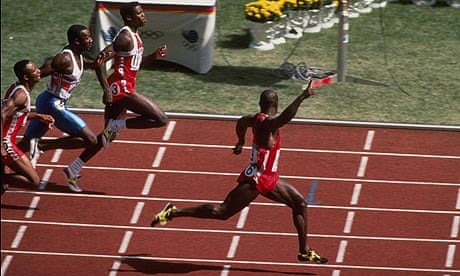The sport of track and field is what Notre Dame football is today – an organization basked in glory for achievements awarded several decades ago. For most Americans track and field is watched either (1) every four years during the Summer Olympics and/or (2) when their unathletic child is relegated to the most basic of all sports because he/she was unable to use hand eye coordination effectively to perform decently in a stick and ball sport (I can say this because I was an unathletic child relegated to track and field).
Even the most revered track and field stars aren’t remembered for their actual winning, but more for winning under certain circumstances. Jackie Owen won 4 gold medals in the 1936 Berlin Summer Olympics. Think of all the things needed to be lined up for Owen to be remembered through time: (1) he had to be a minority (2) the Olympics were held in a time and place where Nazi Germany was dominating Europe (3) he had to be an American (4) and he had to win. If any of these four things did not happen, Jackie Owens would be as famous as Jaws 3 (yeah that’s right, the movie studios tried to make a Jaws Universe…). If Owen was British and won all those medals, Americans wouldn’t care and in turn, the world wouldn’t remember. Why? Because America is like what Disney is as a movie studio whereas Britain is more like Lionsgate. In other words, although you personally might not care about the newest Avengers movie coming out, you’ll be hard-pressed to not have heard about it. That’s what America is like when it accomplishes something – the whole world will know about it, regardless if the whole world really cares, because America will make the world care.
Track and field is also remembered for its doping more so
than its winnings. Ben Johnson, the Canadian sprinter, was disqualified from
his gold medal in the 100 meters that took place in the 1988 Seoul Summer
Olympics. This was made famous for several reasons: the first is that Carl
Lewis, an American, would receive the 1988 gold medal and, secondly, Ben
Johnson’s defense for doping did not vindicate him but rather implicated more
of his fellow sprinters. Johnson’s defense was that he only used steroids in
order to be able to more effectively compete with all the other sprinters who
were also using steroids. Ironically, a report disclosed in 2003 by Wade Exum,
the United States Olympic Committee’s director of drug control administration
from 1991 to 2000, issued documents that revealed that 100 American athletes
failed drug tests from 1988 to 2000. The documents revealed that Carl Lewis
failed three drug tests in 1988 and should have been prevented from competing
in the Olympics.
Of course, the Ben Johnson and Carl Lewis stimulants were
self-prescribed, whereas South African runner, Caster Semenya, was ordered to
undergo “sex verification” testing after winning gold in the 800-meter at the
2009 World Championship. The international track officials ordered such testing
due to her muscular physique and vast improvement. In the end the test results
were never shared, and Caster was able to keep both her prize money and gold
medal. Again, track and field entertains the viewers, not from the stories made
at the finish line, but the stories made from it.
Rather than go into full fledge details, let me just end
with this example – Caitlyn Jenner. Need I say more?
So, with all the off the track story lines hovering around
this ancient, respected, boring sport, it Is no wonder that USA Track and
Field, Inc., the nation’s track and field governing body, is in a leadership
feud masked in all sorts of corruption. In 2016 Vin Lananna was elected as the
USATF’s President, which holds a spot on the governing body’s board of directors.
Lananna also operates a non-profit called TrackTown USA and Lananna is also an
Associate Athletic Director of the University of Oregon since 2005. TrackTown
helps facilitate certain international track events in America. One of these
events, the 2021 World Championships, was awarded to Eugene, Oregon. However,
the bidding process was nonexistent. The IAAF (the international body which governs
and awards the venues for the races) bypassed the usual bidding process. The
sole bidder, Vin’s TrackTown USA, won the 2015 bid even though Sweden pleaded
that it wanted to place a bid but was unable to due to the IAAF awarding the
2021 World Championships to Oregon. In 2018 the U.S. Department of Justice got
involved and questioned Vin regarding the TrackTown and the IAAF’s bidding
process. In light of the federal questioning, the USATF board elected to place
Vin on leave. Vin has been on leave since February of 2018.





No comments:
Post a Comment